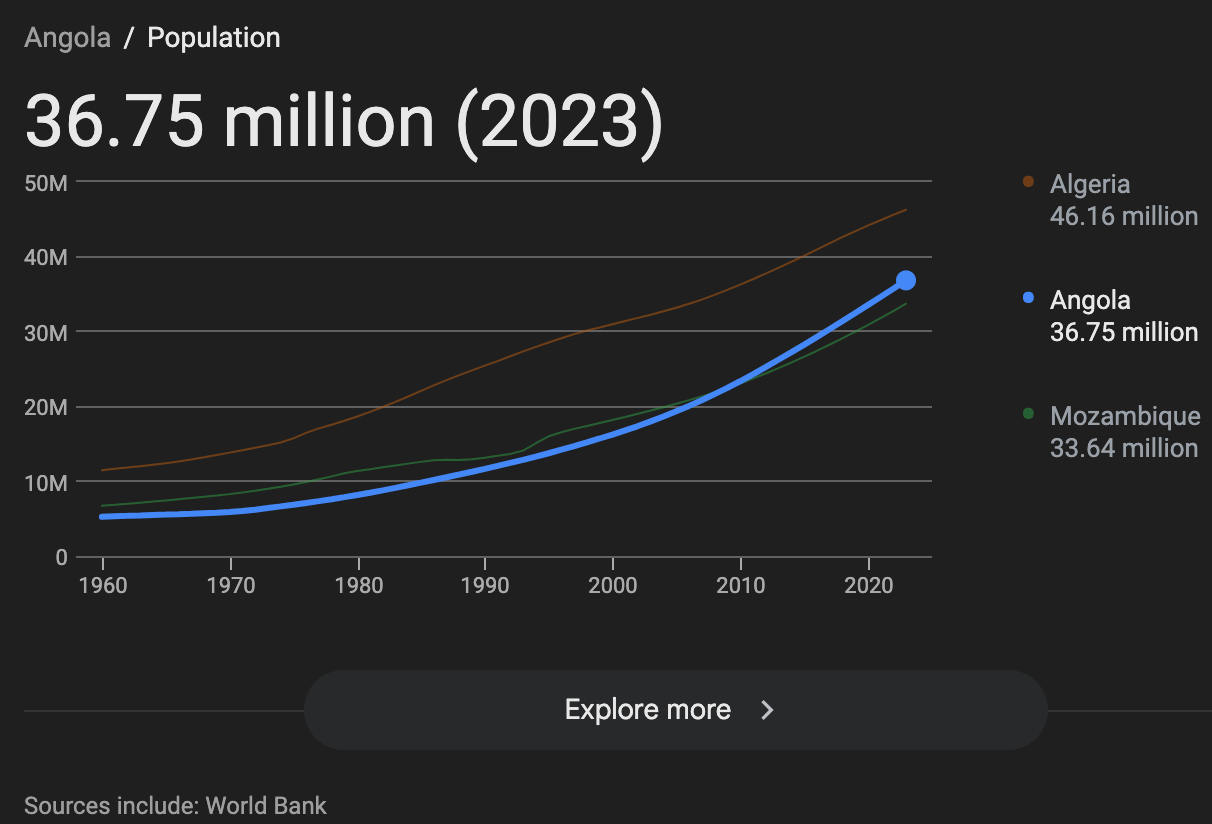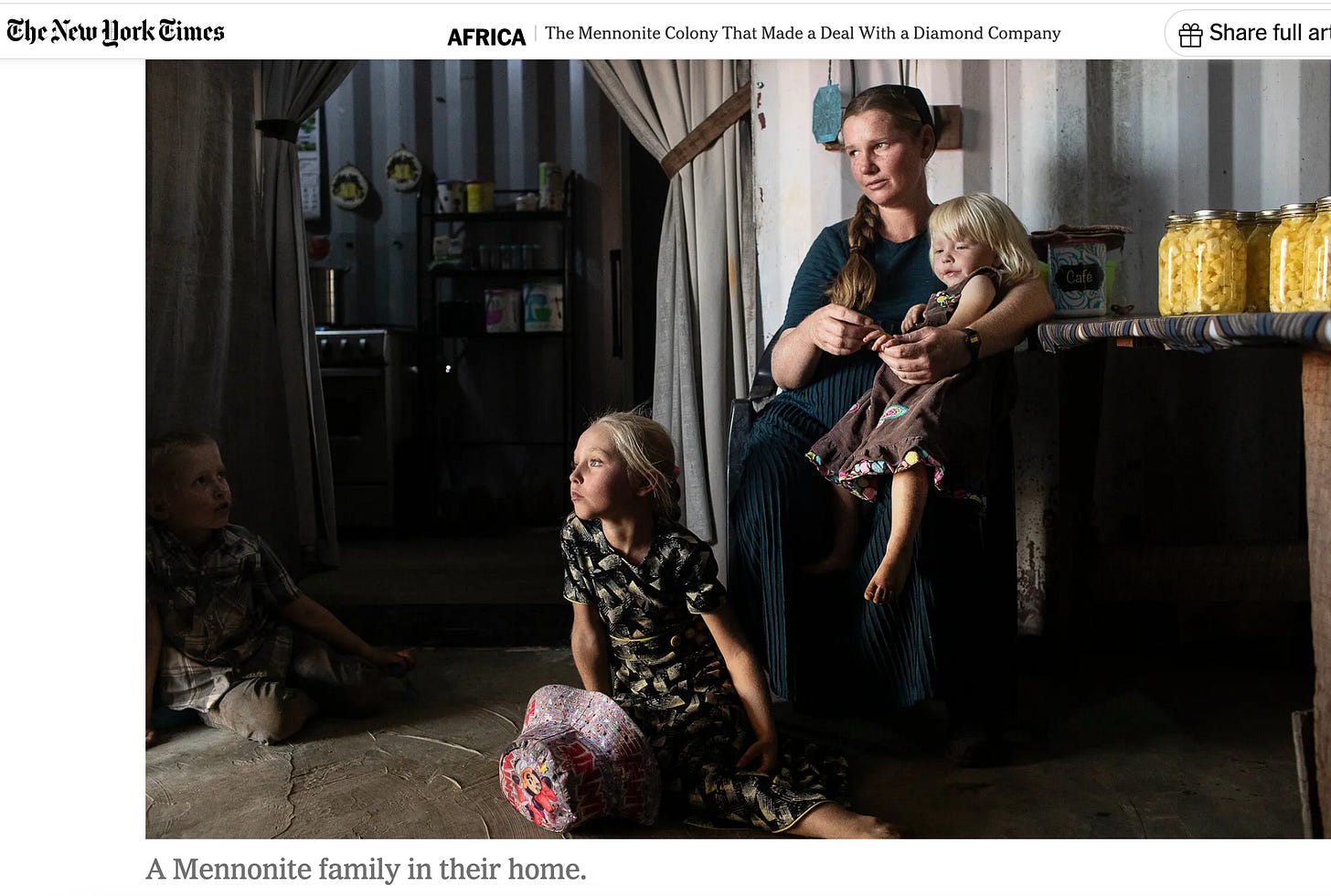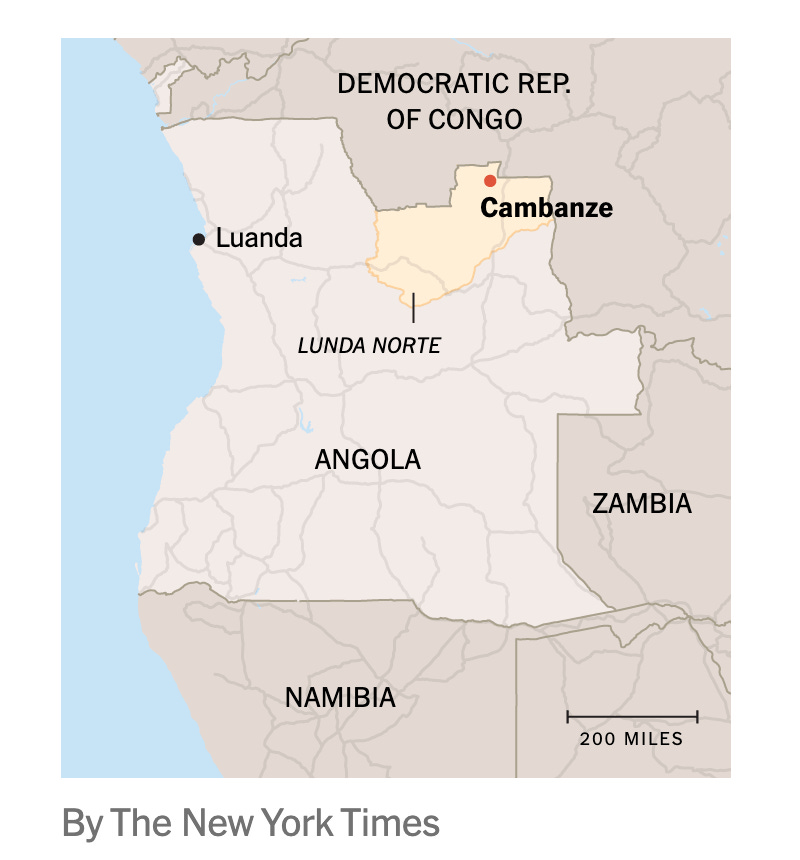NY Times: Immigration Is Bad, Nativism Is Good
At least, when the natives are Angolans and the immigrants are white Mennonites.
From the New York Times news section, an alert about immigrants invading a country:
The Mennonite Colony That Made a Deal With a Diamond Company
Eight families of Mennonites have moved from Mexico to Angola, in southern Africa, raising fears among some Angolans that they will be squeezed out by the new arrivals.
Eight families!
Granted, Angola is approaching twice the size of Texas. It has a lot of potential farmland. The UN Food and Agriculture Organization asserts:
Angola’s wealth of untapped resources, encompassing 35 million hectares of arable land, with only 10% cultivated, offers prospects for agribusiness growth. Favourable climate conditions add to this potential.
On the other hand, most of Africa, other than the volcanic soils in densely populated places like Rwanda (which have their own problems), is not outstandingly good for growing crops. Still, there is a lot of it.
Back to the NYT, which goes on to hint that little farming is done in northeastern Angola:
By Nadia Shira Cohen and Alan Yuhas
Nadia Shira Cohen traveled to the Old Colony Mennonite settlement in northeastern Angola and spent more than three weeks over two trips talking to the Mennonites, their neighbors and officials.
June 15, 2025
Not long ago, the field where Charlotte Itala picks corn with her friends was a hunting ground where people in her small African village caught antelope, boar and forest buffalo.
Usually, the bushmeat trade is deplored. For example, from the BBC in 2016:
Angola is home to Africa's biggest bushmeat market but is now ramping up efforts to stop the illegal trade, reports the BBC's Karen Allen from Luanda.
In a blue plastic bucket is a macabre sight - the head of a small gazelle stares straight ahead, as a woman chops meat from its limp body to the the strains of a popular song on radio.
Angola is not for the squeamish.
Bushmeat is everyday fare here. They call it "Carne de Zaza" in Portuguese. …
Now Angola has become a flourishing hub for contraband from across the region, with billions of dollars netted globally from what has been dubbed "environmental crime."
Syndicates are operating on an industrial scale, and the UN and Interpol warn that this illegal activity has now eclipsed arms smuggling in scale.
So long as there is a market and laws are not enforced, it seems, stamping out this lucrative business will be hard.
The recently released report on Environmental Crime, external - a joint initiative from the UN Environment programme (UNEP) and Interpol - comes with a stark warning.
Failure to address wildlife crime now means sustainable development goals may not be reached.
So Angola is trying to ramp up efforts to outwit the poachers, recruit hundreds of former soldiers to re-train as wildlife rangers, and promise strategies to promote conservation.
"We have a big push to manage protected areas and create others for the benefit of our people," said Abias Huongo, director of Angola's National Institute of Biodiversity.
"For us to survive, other species need to survive," he says.
But the sale of the global problem is staggering. …
Angola hosts Africa's biggest ivory and bushmeat market.
It is a transit point for much of the trade, with ivory smuggled from across the border in the Democratic Republic of Congo.
A recent seizure of elephant tusks were displayed incongruously in the airport lounge - testimony to at least 11 elephants which fell prey to this spiralling crime.
Ivory traders face the threat of three years in jail or a hefty fine under Angolan law but insiders admit not enough is being done to enforce the rules.
In any case, the population of Angola has tripled since 1990.
I’m not sure that hunting bushmeat, fun as it may be for the men of the country, will suffice for the large number of future Angolans.
Now that land has been plowed over by her new employers, a group of Old Colony Mennonites.
The Mennonites, adherents of a Christian sect founded in the 16th century, number nearly 60 people in all, most of whom set out from Mexico almost a year ago to establish a settlement in northeastern Angola.
Paywall here.
I knew a fellow who’d been born in a Mennonite colony in Baja California.
Mennonites, unfortunately for the NYT, tend to be intolerably blonde:
As part of an agreement with a diamond mining company, they have cleared and cultivated nearly 2,000 acres, hoping to build a community that other Mennonites from the Americas can join. …
Angola is 308,096,000 acres, so the Mennonites are now cultivating 0.0006% of Angola.
The new families, who use shipping containers as makeshift homes, have impressed some Angolans but raised fears among others. In Ms. Itala’s village, Cambanze, some worry that the Mennonites may be just the latest outsiders to move in with little regard for the people who live there.
Seriously, how many outsiders have ever moved into Cambanze?
“If they take our land, we won’t be able to grow our cassava — and then what are we going to eat?” said Ms. Itala, who makes $2.50 for seven hours of work in the Mennonites’ field. The money does not make up for the loss of her village’s hunting ground, she said. “We are worried for our future.”
The Mennonites avoid using the word “colony” in their new home. It conjures visions of a brutal past for Angolans, whose country was for centuries exploited by Portuguese colonists trading in resources and human beings.
Calling their settlement the Fields of Hope, the Mennonites describe themselves as enthusiastic partners of the Angolans. They say they will set aside about 12 acres of land for each nearby village and teach people to farm like them.
“Angola needs cultivation, and we need land,” said Jacob Froese, one of the Mennonites. “I see us as a pair.”
Although Angola has immense oil and mineral wealth, the country has long struggled with widespread corruption, high rates of unemployment and poverty. Most of rural Angola has little access to electricity, and hundreds of villages like Cambanze rely on hunting, harvesting cassava and collecting butterfly larvae, which is sold as food. …
Like the Mennonites, Ms. Itala’s husband, Tiago Sumixi, is proud of his family’s history. He comes from a long line of Chokwe hunters who fiercely resisted Portuguese colonial rule.
But between the farm and the diamond mine to come, he and others in Cambanze share a growing anxiety that they are being squeezed out.
“We are paralyzed,” he said. “We have nowhere to go.”
Besides the obvious immigration examples, it’s an interesting question whether importing more advanced German farmers ever does the existing population much good.
It appears that the British population of the north-central U.S. benefited from large numbers of industrious German farmers immigrating.
On the other hand, German Czarina Catherine the Great’s 1760s initiative to import sophisticated German farmers to backward and underpopulated parts of Russia like the Volga didn’t much spread better agricultural techniques to the Russian masses. Admittedly, about a century later, Russian intellectuals started to pay attention to the Volga Mennonites, but Catherine’s hopes were mostly stillborn.
Similarly, I doubt that Mennonites will do much to inspire cassava-farming Angolans to become diligent corn-farmers.
But, who knows?





Mennonites are pacifists so I'm not sure this is a great idea (from their perspective).
Almost all the time, the Times and the rest of the media can be summarized rather simply:
"White People Bad"
But the thing that gets me - I know I am naive and stupid I guess, but still - is how most of the people who write that nonsense are themselves white. Very hard for me to comprehend.